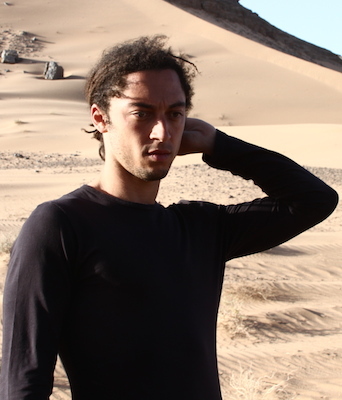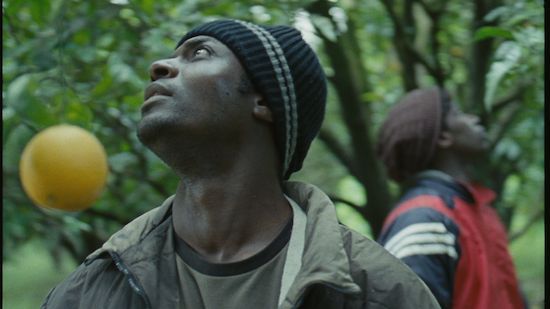Anywhere in the world, from the U.S. to Italy, from Dubai to Sydney, newspapers and broadcast outlets are talking about the issue of immigration. But to me, honestly, anything that is written in bold letters or ticker-taped across the bottom of a TV screen, holds little meaning; deep, emotional meaning that is. What drives an issue home each and every time is when it is made personal, when the headlines become faces, or in this case when the refugees of war, hunger, religion or politics, turn into human beings -- just like you and me.
In his feature debut Mediterranea, filmmaker Jonas Carpignano does just that, allow us to discover the humanity behind the headlines. The film recently screened to rave reviews at the Festival de Cannes as part of Critics' Week, and it's no surprise. Carpignano is one of those enlightened multi-hyphenated polyglots who easily navigates the waters of pluriculturalism with grace and understanding. I admire his POV, his mission of making the audience view each person, each immigrant as an individual, as he does so masterfully in Mediterranea. Because the day we will put an end to broad sentences and generalizations about those who come through our borders and to our shores, will be the day we finally see that the issue is not about their masses, but about our humanity.
As much as it is politically incorrect to refer to any ethnic group in sweeping statements, so it should be wrong to refer to all who come seeking a better life as immigrants, and refugees. Each case should be considered as distinct as each human being is unique. In Mediterranea, each character embodies a different side of our society and while the film takes place in Calabria, it could be set anywhere in the world where immigration exists -- everywhere in the world.
I caught up with Carpignano at the Nespresso Beach in Cannes, on a sunny, hot, crowded day during the festival. At his suggestion, we found a spot on the floor and sat crossed legged in the much-coveted shade talking about his film, his background and whether movies can help heal this world of ours. I left our chat inspired and with renewed hope in humanity. You'll see why once you read on.
Did you know you were making such a timely film when you started?
Jonas Carpignano: I always felt we were too late to the story. I've been living in this world for the past five years... I wouldn't say I'm desensitized to all the tragedies that are happening but to me they are more expected and they happen on the calendar. I know every May as soon as the waters get warm one of the first tragedies happen and everyone's up in arms about it until it happens again the next year. And that's been happening for five years.
You help us focus on humanity with your film but did you set out to instruct?
JC: I think I set out not to instruct, not to be overly didactic. The facts are there, and with this film I take it for granted that the audience knows certain things on immigration and try to focus on one person, hopefully to bring the audience closer to his experience. Closer to his mindset, the why do people take this journey, why they stay.
You yourself are multicultural, you must face people always looking at you as...

Like I don't feel alienated or ostracized, I still feel I belong -- I'm just different.
Is that the answer to all our world issues, live a day in your shoes?
JC: Absolutely not. Where we live and where we work is a very small microcosm in a very small reality. I don't think we should translate the realities of our existence to the rest of the world.
As a single human being, how can we help fix the immigration issue?
JC: It's a motivation for making Mediterranea and that is the second we stop thinking of African immigrants as a group, as "those people who got off the boat" and we start thinking of them as Ayiva [played by Koudous Seihon], a specific person, it becomes a lot easier to understand the motion of what they are going through, and compassion immediately follows. The more specific it is, the more we can reach people and the more compassionate we get.
Do you think filmmakers would make great politicians?
JC: I wouldn't want to be in the town that I was the mayor of! I feel very lucky to make films, I'm able to create and collaborate with friends and people I care about. It never feels like a job, we don't tell each other what to do, it's very organic. The second you bring politics into it, it stops the process. It's a bureaucracy that impairs the work. The idea was to make it where it actually happens without the more transitional infrastructure and the politics that go along with it.
Is that why the film is a narrative and not a documentary?
JC: I feel like had I made this film as a documentary I would have been making a film about people and this time I really wanted to make something with everyone that was there. In a doc you keep that line of "I'm observing this" but this film was all of us together creating scenes, situations and events that were representative of the experiences there. I wanted that back and forward. This process lead to a lot of unpredictable things that to me are the real flavor of the film.
What do you want the audience to take away from your film?
JC: I think it's important, especially for Italians, to acknowledge the concept that this is not a fleeting issue. It's not a fad, it's not something that we'll talk about as something that happened in the 2000s. But it's something that is changing the fabric of Italian society, especially in Southern towns and the sooner we embrace, the sooner it will become something positive.
Do you think cinema has the power to change the world?
JC: It's very difficult that one thing can change the world. It can help, it can participate in the catalyst and be the spark for a bigger conversation and I think cinema can do that.
An example of a film that did that, in your opinion?
JC: Rosetta, by the Dardenne brothers. They made this film about this young girl and unemployment in Belgium. I think by being so specific and tailoring unemployment to this one girl they were able to raise awareness about it. If I'm not mistaken until recently a labor act in Belgium was called the "Rosetta plan", very much named for this film. That's the power of not being didactic. the power of allowing an audience to connect to one person. Because allowing an audience to see something in a film in way more powerful than reading pages and pages of stats about it.
Facts can be misleading and emotions can be very very real.
What is the first film you remember watching?
JS: Sunday in August by Luciano Emmer with Marcello Mastroianni. The filmmaker is my great-uncle, I was six or seven. I also remember Once Were Warriors, I was much too young, my father made me watch it.
Three words that describe you?
JC: Gioia Tauro [from the port in Calabria where the film takes place] tutta la vita.
Images courtesy of Semaine de la Critique, used with permission.

